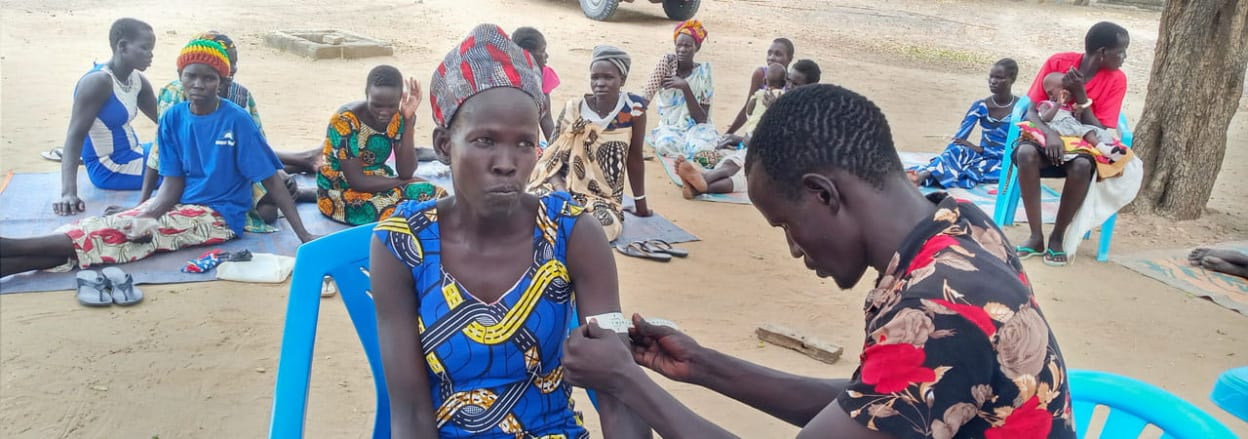Going further than food
In a world of plenty, no one should be going hungry. And yet, many people still don’t have enough food to feed their families.
Written by Tearfund | 15 Oct 2020



Written by
Written by Tearfund
In a world of plenty, no one should be going hungry. And yet, many people still don’t have enough food to feed their families.
The World Health Organization (WHO) says almost 690 million people are going to bed hungry every night.
But, Tearfund believes hunger is not God’s plan. That's why we're working in some of the world's most vulnerable countries to help them overcome malnutrition.
Life-saving work
In South Sudan we provide life-saving nutrition services to help children and pregnant and breastfeeding women who are suffering from malnutrition.
‘Tearfund believes hunger is not God’s plan’
Across the country, half of all South Sudanese people don’t have enough food to eat. Ongoing conflict and recent flooding means many are being forced to flee their homes, and can’t grow food to eat or keep their businesses going.
Feleke Asamo is Tearfund’s Nutrition Adviser in South Sudan. He told us that because of the ongoing insecurity and the difficulty of accessing roads in some of the areas where we work, his work is challenging.
The threat of attacks makes it harder for supplies to be transported to the nutrition centres. It’s also harder for those who are in need to access these services.
Added to this, there has been severe flooding in many parts of the country and the ongoing coronavirus crisis has been challenging too.
‘Working closely with UN agencies, the local authorities, and with other partners who are working on the ground, we are able to do this work, but it’s not easy,’ says Feleke.
Coronavirus considerations
Feleke and his team are following the South Sudan authorities’ guidance for coronavirus, and this means they’ve changed some of the ways they work.
Depending on the needs of the patients one or two month’s supply of medicinal food is now given out, instead of the usual weekly or fortnightly supply. This helps people avoid having to regularly mix closely, and reduces the risk of the virus spreading.
‘'We are able to do this work, but it’s not easy.'’
Tearfund currently runs 27 nutrition centres in three counties of South Sudan. In most cases, with the right treatment, people make a full recovery.
‘I’m very happy when I see that those who have gone through our programme, are cured, discharged, and able to take up their normal activities. That is satisfying for me,’ says Feleke.
But there is more work to be done. As long as factors like conflict, flooding, and diseases like coronavirus and malaria are present, new cases of severe malnutrition will no doubt continue.
A vicious cycle
‘Malnutrition affects people in so many ways – and it starts in the womb,’ says Anthony Rama, who leads Tearfund’s work in South Sudan. ‘A child who is conceived and not fed properly already is set up for a lifetime of difficulties.
‘They are not able to grow and reach their full potential. It affects their productivity – they are not able to do manual work, such as farming, when they become adults. And it affects their ability to engage in economic activities where you also need to be strong mentally.
‘So the likelihood of them being poor as adults is high, and it means there’ll likely be another generation who are conceived in malnutrition, being born and growing up with its effects. Some say the effects of malnutrition are cyclical, they go from generation to generation.’
So, what can be done to break that cycle?
As well as our work at nutrition clinics tackling the obvious and visible effects of severe malnutrition, Tearfund also works alongside communities informing them about the dangers of malnutrition and what can be done to avoid it.
We provide access to clean drinking water and share best practices for good hygiene and sanitation. We also run peacebuilding workshops, to address one of the root causes of malnutrition: conflict.
‘We’re helping communities to reconcile, so people can rebuild their lives,’ says Anthony Rama.
By working together and addressing the different root causes of hunger we can begin to see long-term change to this devastating cycle that keeps people in the grips of poverty.
Please pray
‘For I was hungry and you gave me something to eat, I was thirsty and you gave me something to drink, I was a stranger and you invited me in.’ (Matthew 25:35)
Lord God,
We lift up to you all our brothers and sisters across the world who are hungry. Heal those who are sick from malnutrition. Thank you for your goodness and provision to us, and show us how best we can respond to your call on our lives to help those who are caught in cycles of hunger.
Amen.
Similarly Tagged Content
Share this page
Share this page to spread the word and help support those in need.

Get our email updates
Learn about our work and stay in touch with Tearfund. Hear about our news, activities and appeals by email.
Sign up now - Get our email updates






